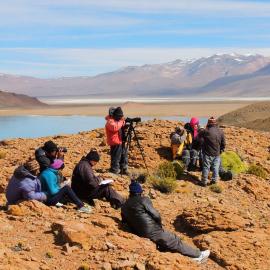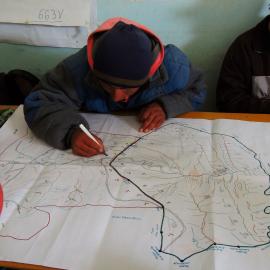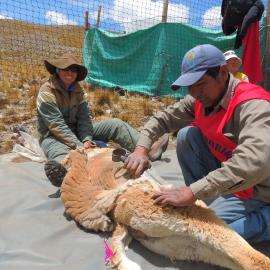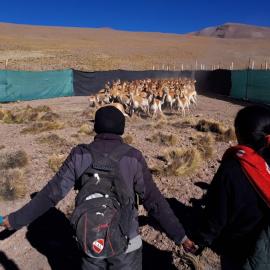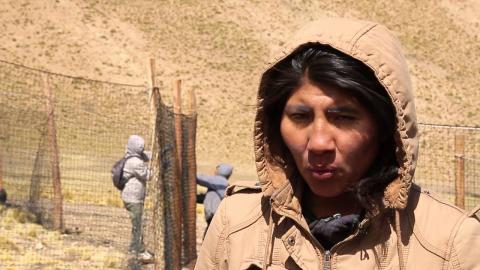Conservation and sustainable use of wild vicuña in Andean communities
Current initiative
Published
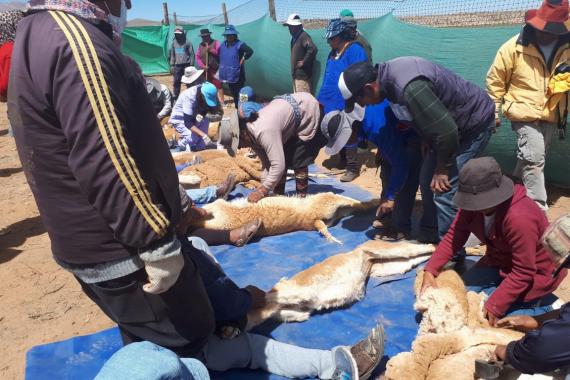
Shearing the vicuna. Credit: José Manuel Segovia
The vicuña is a very valuable natural resource for the people who live in the Andean communities of Jujuy province, Argentina. A government implemented sustainable management plan has supported local communities to catch, shear, and set free vicuñas so that they may generate an income from the sale of vicuña fibre. The project has reduced illegal hunting and improved livelihoods for the communities involved.
Lead
Location
The project is being implemented in communities located in the Puna and High Andes ecoregion of Jujuy province.
The poaching and wildlife trade problem
Species affected Vicuña Vicugna vicugna
Products in tradeWool from the fleece of the vicuña
Overview of the problem
Illegal hunting has been identified throughout the province, carried out by both local community members (who are not involved in the project) and those from neighbouring countries.
The anti-IWT initiative
Since 2012 the Environment Ministry’s Biodiversity Secretariat in Jujuy province has implemented the “Provincial Plan for the Conservation and Sustainable Management of Wild Vicuña”. This has involved working with indigenous communities in Jujuy to prepare local management plans for the vicuña.
The aim is to ensure the sustainability of the vicuña for economic development by supporting communities in the chaccus (the process of catching vicuñas, shearing them and then setting them free), in the hope that they will soon cease to depend on government assistance. The implementation of the chaccus of vicuña is targeted in areas where illegal hunting is prominent.
Vicuña fibre fetches between US$450-550 per kg on the international market, representing significant income for the local communities. To ensure that vicuñas are not illegally hunted, control measures have been strengthened and a system developed that allows the wool to be traced.
The strategy
Strengthening disincentives for illegal behaviour
Workshops are held where communities are given information about the procedures that need to be followed when reporting illegal hunting, such as which law enforcement agencies they can turn to. These workshops are run as many times as the community requires and has led to them playing a leading role in patrolling their territories. Some communities are also working with local park wardens to patrol the reserve together in order to prevent incidents of illegal hunting.
Increasing incentives for wildlife stewardship
Legal trade is being promoted by carrying out the chaccus of vicuña and the subsequent sale of vicuña wool.
Decreasing the costs of living with wildlife
Several communities have designated areas of their territory to be set aside for the creation of community reserves.
Build/and or support sense of community ownership or stewardship
Further detailAll the work that this project is carrying out is aimed at strengthening the sense of unity between communities.
Improving education and awareness
Further detailCommunities have attended workshops on the following topics: Cultural and natural heritage, knowledge of vicuña management in other countries, international, national and provincial laws, the Management Plan and Conservation Plan, inter-community agreements and training needs, mapping of the vicuña’s territory and the community census, illegal hunting, design of the module for the chaccus of vicuña, presentation of the proposed Management Plan.
Has the initiative made a difference?
The project has strengthened the sense of unity between communities and empowered them to take responsibility for the vicuña, resulting in a considerable reduction in incidents of illegal hunting. Training workshops have prompted communities to play a leading role in patrolling their territories. The number of the chaccus have increased each year and the communities have started to implement land use plans, leaving some areas unfenced for the vicuña. These areas often coincide with sites of high ecological interest and illustrate that the communities understand the importance of conservation.
The success of the project has led to the introduction of craft making. Communities are trained in crafting products from vicuña fibre and it is hoped that a market can be established in Buenos Aires to generate further income.
What works and why
The range of different professionals working at each institution involved in the project has allowed appropriate support to individual communities.
Factors for success
Supportive, multi-stakeholder partnerships with a shared vision
Sufficient time investment in building relationships and trust between the initiative and local communities
What doesn’t work and why
A challenge has been not spending enough time working with the communities to train them in the chaccus. When the process was sped up for one community, it resulted in a significant number of vicuña deaths, so it is very important that training is undertaken properly.
Not having long-term donor support means the project cannot expand to work with new communities.
Factors that limited or hindered success
Lack of long-term donor support that is flexible, adaptive and/or based on realistic time goals
Organisers, donors and partners
National Farm Work Institute (INTA), Family Farming Secretariat (SAF), Ministry of Production in Jujuy Province and the National Parks Administration Office (APN).
Other organisations providing support are the Association of Puna Region Municipalities and the municipal councils of El Condor, Yavi, Rinconada, Santa Catalina, Cusi Cusi and Pirquitas.
Funding from the “EX 2018-46384424-APN-CFESYP3 MSYDS” project to strengthen social economy enterprises, which is run by the organisation “Magis Civil Association for Research and Promotion of Human Development and Justice” with support from the National Ministry of Social Development.
For further information contact José Manuel Segovia (josmse@yahoo.com.ar).
